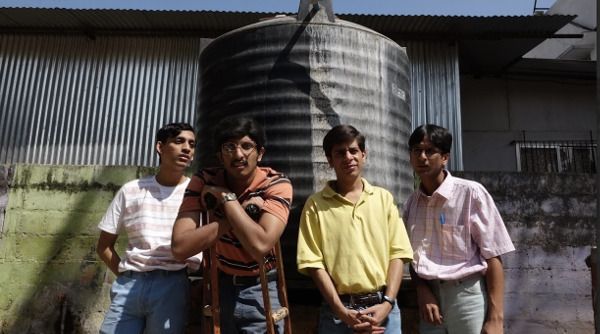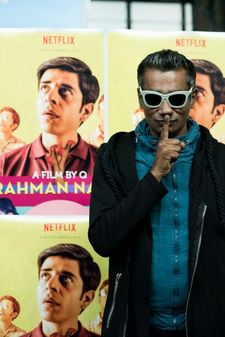 |
| Q: 'At the start of the film we make it very clear men are making this film but we are completely aware of our shortcomings as a gender' |
Certainly, he looks the part, wearing sunglasses inside a hotel on a fairly grey afternoon. Music plays a key role in his coming-of-age comedy that mixes quiz brain geekery with a trio of lads' desire to lose their virginity, driving the action on and sometimes acting as a 'chorus' between scenes. Q says his filmmaking process begins with the music.
“This is not my script but when it arrived I could already see the potential of the music because the first scene began with Locomotive Breath [by Jethro Tull]. I was like, can we really get that? If we can get that then I can see the scope of the film in a completely different way. What happened with the music is, as you can see, it's a very low budget film. So we didn't have production money to push into values so instead of having a period car, we have a period song – and that takes care of it. It just builds the environment in which you are going to see this and the context in which you see the story unfold.
“All my films are musicals in one way or another and this also ended up having that same sort of musical rhythm.”
The film – which sees its main character Brahman Naman (Shashank Arora) and his pals Randy (Vaishwath Shankar) and Ajay (Tanmay Dhanania) head for a pan-India quiz contest while learning life lessons on the way – also features animated segments which Q says were also there to give the film a texture.
“Even as a filmmaker I don't fancy myself as being a very good one, so I fall back on these things,” he says. “I rely on the music, I rely on the design because I consider myself to be more of a designer than a film technician. I wasn't trained in film but I was trained in design, so I understand the value of design. I've never used animation before this but I've used text as a very important part of my filmmaking logic and the way the narrative builds itself around words or even letters.
“Like, I'm called Q, they're very critical for me, these consonants and letters that emerge as having some meaning to them. For me this was surely the next step after having the live action bit. We had the music, we had the live action and we knew, okay, now we have the narrative in place, how do we spice this, how do we design it. That's when the animation came in and we were influenced heavily by the kind of animation that was being done in India at that time – it was a very blocky animation, totally analogue but very sweet. We tried to get that value system.”
Among other things, the film includes several very inventive scenes of masturbation, which writer Naman Ramachandran says are rooted in fact. I mention it to Q and say I'm quite worried about family fridges up and down India now.
“You should be, if there's a horny boy lurking around somewhere,” he says.
Leaving the "horribleness" of young men to one side, we talk about the caste system, an ancient tradition which means you are marked out in terms of social class by birth – with Brahmins at the top, stretching down to a group not classified at all and regarded as “untouchable”.
That leads us on to a discussion of women, with all the girls in the film essentially objectified by the guys right the way through, what does Q think about those attitudes?
“Men around the world are pretty obnoxious creatures,” he says. “At the start of the film we make it very clear men are making this film but we are completely aware of our shortcomings as a gender. I think we all found it really interesting to delve into the funniness of that rather than delving into the topic seriously.
“In this film, it was very interesting because we were talking about boys who were trying to get laid but they didn't understand anything about the girls. Though they objectified them, the girls always turn round and slap them in some way. They have their revenge, all of the girls, but none of the boys do. If you see the narrative itself tells you what our stand is but it also depicts our reality.”
It's a good time for Indian filmmakers who are again rising to prominence on an international stage, with names like Ritesh Batra (The Lunchbox) and Kanu Behl (Titli) making film festival waves.
“This whole community of independent filmmakers in India, we all know each other,” says Q. “We might come from different parts but I think it's a pool that is growing very quickly. One of the major things are the actors, who have much wider reference points than the average actors in Hollywood. They have mostly trained in theatre in one way or another, they're not only film-y.
“I think it's started and it's an avalanche because all of us guys are so motivated about this and it's all been going really well. I feel reassured that every year we're getting one or two killer voices coming from India. Finally, we're at a level where we can talk in this international language of cinema, which we couldn't have six years back. I wouldn't say it's about Bollywood or commercial film it's just that I think we are finally finding our language of cinema.
“India is such a diverse place – we have 48 different languages – so cinema will also have that kind of reality. But at the same time there's a sort of truth in our work. We're feeling it instead of just making a film. It's not a job to us. That's a big difference. For years, the big industries totally monopolised this thinking in film and we are reclaiming it. That's a big thing.”
Speaking of big things, selling to online VoD subscription service Netflix is certainly that. Instead of the usual piecemeal release for smaller films, Brahman Naman will go global on July 7. How does he feel about that?
“I feel fucking ecstatic,” he says. “I think it's a marriage made in hell, which is amazing because I like hell much more than heaven. I'm not Christian obviously, so I don't have Gothic tendencies. But in terms of how I would place myself, I would see myself having a much better time in hell. So I think it's a great thing. We've been waiting for this for years. How long have we been waiting for a VoD platform that would facilitate this kind of content?
“Now finally with Netflix, its very reassuring to see the people who are handling our film are completely invested in it. It's not like a distributor who is doing us a favour by picking up a small film and pushing it out territory by territory, which was what was happening. If you were really lucky and you premiered in a big festival and you were doing really well on the festival circuit, there was half a chance that you would get three sales in Europe, plus India, and you know the distribution conditions there. We just spoke about the films being really strong. So this is a weird situation. The films are strong, people really want to watch it but nobody will sell it. This is what we we are getting right now – 192 countries.”
The global release means Q is now free to move straight on with additional projects and he already has a drama and a sequel to his 2015 horror film Ludo in the pipeline.
He adds: "I think India right now is a cauldron of activity, because the country is really young and very confused. That's a brilliant situation, you have young, chaotic minds to reach out to and they are eager. We've been deprived for ages of serious, thought-provoking stuff and that is going to come right now and I think it can only go up.”
Brahman Naman launches on 7 July, exclusively on Netflix.
Watch the trailer:






















